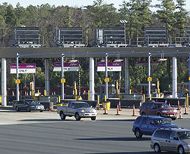Virginia: Toll Road Users Sue Over Diversion of Funds to Rail
Users of the Dulles Toll Road in Northern Virginia filed a federal class action lawsuit yesterday seeking refunds from toll hikes imposed to fund a $7 billion mass transit project. Great Falls resident John B. Corr and Hillsboro resident John W. Grigsby argued that the Metropolitan Washington Airports Authority (MWAA) has no authority to set toll rates and that the diversion of over $130 million from motorists constitutes an illegal tax.
“‘No taxation without representation’ is not simply some slogan redolent of a past age of patriots and heroes,” attorney Robert Cynkar wrote on behalf of Corr and Grigsby. “Rather, it is an ever-vital principle at the heart of representative government and the liberty such government is established to preserve… This case challenges exactions of money from motorists, through the tolls they pay for the use of the Dulles Toll Road, that violate this fundamental principle and so are unconstitutional under the federal and Virginia constitutions.”
In 2005, the Commonwealth Transportation Board increased the amount of tolls far beyond the cost of operation, maintenance and debt service for the Dulles Toll Road. The extra money was meant to be used to bankroll the construction of a Metrorail line to Dulles International Airport, 25 miles outside the nation’s capital. MWAA took control of the toll road in 2008.
The Virginia General Assembly never authorized the MWAA authority to set toll rates, and it could not do so, Corr and Grigsby argue, because the MWAA’s 13-member board is appointed by the District of Columbia’s mayor, the US president and the governors of Maryland and Virginia. As an interstate entity, it has no power under the Virginia constitution to impose a tax.
The state constitution mandates that all taxes must be passed by the legislature so that specific representatives would be held accountable for their votes (Article 4 Section 2). Likewise, the constitution bars establishment of any government “separate from, or independent of, the government of Virginia” within the state (Article 1 Section 14). In 2008, the state supreme court interpreted these provisions to mean that “the General Assembly may not delegate its taxing power to a non-elected body.”
In 1995, the General Assembly did pass an act authorizing the Commonwealth Transportation Board (CTB) to divert toll money for the use of mass transit. Corr and Grigsby argue this law is unconstitutional because CTB is an unelected body. The plaintiffs are asking the US District Court for the Eastern District of Virginia to prohibit MWAA from setting rates and to refund all money illegally collected.
[Courtesy: Thenewspaper.com]
More by The Newspaper
Latest Car Reviews
Read moreLatest Product Reviews
Read moreRecent Comments
- MaintenanceCosts Poorly packaged, oddly proportioned small CUV with an unrefined hybrid powertrain and a luxury-market price? Who wouldn't want it?
- MaintenanceCosts Who knows whether it rides or handles acceptably or whether it chews up a set of tires in 5000 miles, but we definitely know it has a "mature stance."Sounds like JUST the kind of previous owner you'd want…
- 28-Cars-Later Nissan will be very fortunate to not be in the Japanese equivalent of Chapter 11 reorganization over the next 36 months, "getting rolling" is a luxury (also, I see what you did there).
- MaintenanceCosts RAM! RAM! RAM! ...... the child in the crosswalk that you can't see over the hood of this factory-lifted beast.
- 3-On-The-Tree Yes all the Older Land Cruiser’s and samurai’s have gone up here as well. I’ve taken both vehicle ps on some pretty rough roads exploring old mine shafts etc. I bought mine right before I deployed back in 08 and got it for $4000 and also bought another that is non running for parts, got a complete engine, drive train. The mice love it unfortunately.


































Comments
Join the conversation
Pennsylvania regularly takes fuel and other taxes meant for road and bridge construction/maintenance and sends these funds to SEPTA and other regional public transits. Because they can't continue to operate otherwise.
While the suit seems legally questionable, the issue it raises is not. Highways are supported by federal and state taxes on motorfuel. Essentially, they are self-supporting. However, politicians' and certain interest groups (not to mentions Siemens, which advertises very heavily around here) have a love affair with "heavy rail" i.e. expensive to build and operate subway trains. The money to pay for these lovely projects has to come from somewhere, and highway tax money offers a tempting target. The reality is that these projects are all uneconomic. The metro system basically operates at capacity during rush hours, yet for people who have to travel any distance (fares are based on distance traveled), it's cheaper to drive and pay for parking. Despite this, metro loses buckets full of money every year and has to be subsidized by federal and local government tax money. If riders paid the true cost of metro, no one would use it. And metro has been operating since the mid-1970s. Tyson's corner was nothing more than a shopping mall that opened up in the late 1960s. Unfortunately, its growth was not coordinated or planned, nor integrated with an upgraded road system. While there's no doubt in my mind that a subway link to Tysons would be useful for all of the people who work there, I have my doubts about a link to Dulles Airport. Schlepping your luggage on a subway is not most people's idea of a good way to get to the airport. There is, of course, a dedicated airport access road that provides pretty quick access any time of day.